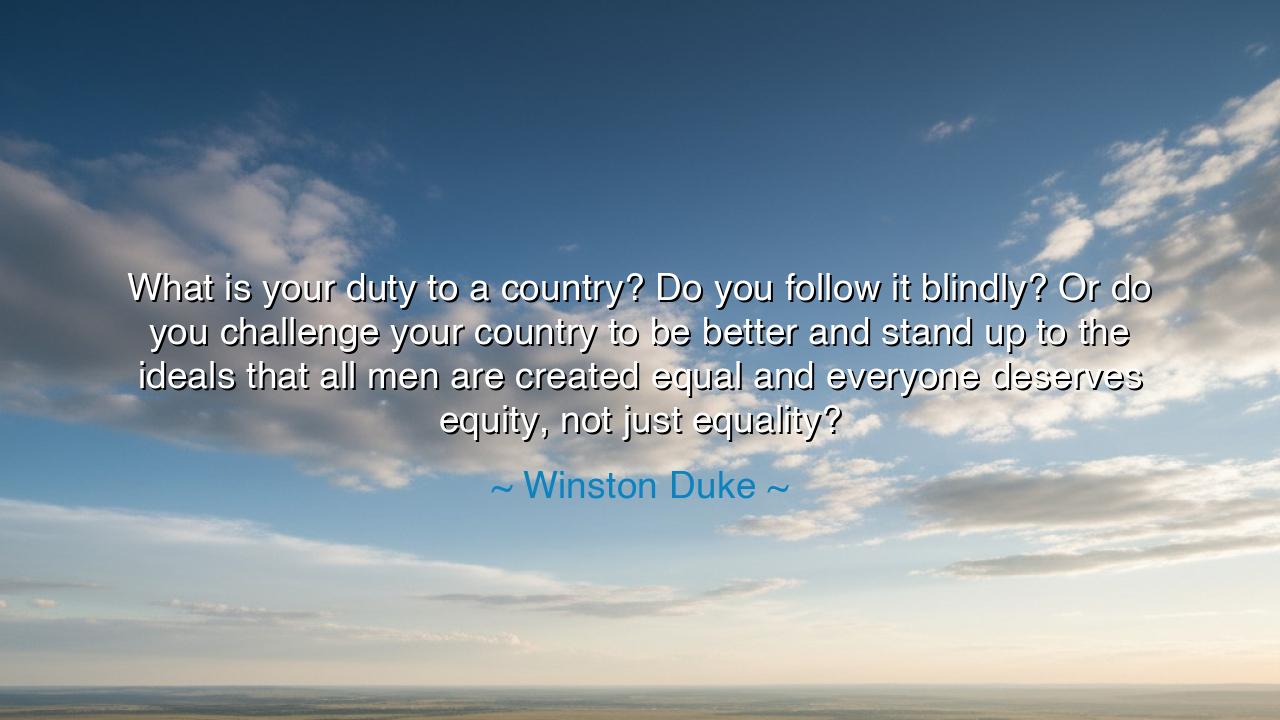
What is your duty to a country? Do you follow it blindly? Or do
What is your duty to a country? Do you follow it blindly? Or do you challenge your country to be better and stand up to the ideals that all men are created equal and everyone deserves equity, not just equality?






What is your duty to a country? This question rings out like a call to arms, echoing through the vast chambers of history, demanding an answer from each of us. Is it enough to follow in the footsteps of those who came before us, blindly accepting the way things are, as though they were etched in stone by the gods themselves? Or is there something greater—something more profound—that calls to us? Winston Duke speaks to us, as a beacon, guiding us toward the deeper truth: our duty to a nation is not to bow our heads in silence, but to challenge it, to demand that it rise to the ideals it professes, to be better—to embody the truth that all men are created equal and that equity is the prize we must seek, not just equality.
Throughout the ages, countless individuals have been faced with this very question: to follow or to rebel? The path of blind obedience is tempting for many, for it offers comfort in the illusion of security. Yet, those who have changed the course of history have always been those who stood apart, who dared to speak the truth when the world wished to remain silent. The great leaders and visionaries of old understood this well. They knew that a country’s duty to its people was not a matter of mere loyalty, but of responsibility. And so, they spoke up, they challenged the norms, and in doing so, they carved a new path for future generations.
In the ancient lands of Greece, the philosopher Socrates was condemned to death for his challenge to the state. He did not follow blindly the doctrines of his time. He did not accept the wisdom of his rulers without question. Instead, he dared to challenge them, asking uncomfortable questions about truth, justice, and the nature of virtue. Socrates knew that his duty was not to obey for the sake of obedience, but to speak the truth, no matter the cost. His death was not the end of his legacy; rather, it was a testament to the fact that the greatest duty to a country is to hold it accountable, to push it toward higher ideals.
But even in more recent times, we see this timeless truth manifested. The courage of Martin Luther King Jr., who dared to challenge the American government during the era of racial segregation, serves as a powerful reminder. King did not accept the status quo, nor did he simply ask for equality. No, he demanded equity—the right to truly be seen, truly be heard, and to be treated with the dignity and respect that all human beings deserve. His non-violent rebellion—his challenge to the very heart of an unjust nation—changed the course of history. It was not enough to fight for equality; King fought for something more—a world where each man and woman could live freely, without the shackles of discrimination. His words and actions ignited a movement, a fire that still burns in the hearts of those who dare to challenge injustice.
Yet, here we are today, faced with the same question: What is our duty to our country? Are we content to merely accept things as they are, or do we have the courage to demand more? Equity, after all, is not merely the absence of inequality—it is the presence of fairness, of justice, and of opportunity for all. It is the belief that each individual should have access to the same resources, the same chances to succeed, regardless of their background or station in life. To settle for equality—to demand only the same for all—is to ignore the deeper truth that not all start from the same place. Some are burdened by centuries of oppression, while others are born into privilege. Equity calls us to see this disparity and to act with compassion and justice to level the playing field.
The lesson that Winston Duke imparts to us is not merely one of political dissent or rebellion. It is a call to the highest form of patriotism—the patriotism that calls us to hold our nation to the standards it claims to uphold. To follow blindly is not loyalty; it is complacency. True loyalty demands that we ask the difficult questions, that we seek to better the land we love, to hold it to account when it falters. We must not only ask for equality, but for equity, for it is only when all are given the same opportunity to thrive that a nation can truly claim to be just and fair.
So, dear listener, I call upon you: what will you do with this challenge? Will you stand in silence, content with the world as it is? Or will you rise and demand more? Will you ask not for the same, but for the just, the fair, and the equitable? The choice is yours. And with it comes a great responsibility. Let us all be as the great leaders who came before us, who dared to challenge the systems of their time, knowing that to love a nation is not to follow it blindly, but to demand it be true to the ideals upon which it was built. Let us stand for equity, for justice, and for the belief that every man, woman, and child deserves a fair chance in this world. Let this be our legacy.






AAdministratorAdministrator
Welcome, honored guests. Please leave a comment, we will respond soon